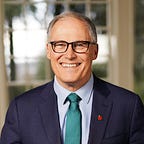Inslee trims 2020 supplemental operating budget to address financial impact of COVID-19
The governor trims $235 million from the 2020 supplemental operating budget
Facing a growing fiscal threat posed by the COVID-19 (coronavirus) outbreak, Gov. Jay Inslee used his line-item veto authority today to trim $235 million from the 2020 supplemental operating budget the Legislature approved last month. The vetoes will reduce spending another $210 million in the state’s next two-year budget.
“These are difficult and challenging times and we must make difficult and challenging choices. Under normal circumstances, I would not veto bills and budget items that are good policy and smart investments for the state. As everyone knows, these are not normal times. ” Inslee said. “As we address the health crisis, we must also look ahead to ease as much fiscal pain as we can. It is all but certain that we will need to make adjustments to our next budget cycle and we must get started now.”
The supplemental budget provides funding the state needs to meet caseload increases and address costs that were unforeseen last year when lawmakers adopted the 2019–21 budget. Lawmakers also approved urgently needed funding to help the state respond to the fast-growing COVID-19 outbreak.
The budget, however, also included other less-urgent increases, including funding for new or expanded programs and services.
When lawmakers approved the supplemental budget three weeks ago, the latest projections indicated the state would have nearly $3 billion in total reserves at the end of the biennium. But the state’s fiscal outlook has deteriorated dramatically since then.
To slow the spread of the coronavirus, the governor took unprecedented actions such as ordering non-essential businesses to close and requiring all Washingtonians to stay home except for essential activities. Similar to other states and countries hit hard by the global pandemic, Washington’s economy has been largely idled in recent weeks and need for state services for impacted workers — such as unemployment and other programs — has risen sharply.
With revenue collections expected to fall sharply this year, Inslee’s budget staff scrubbed the budget for ways to reduce spending in the current budget and the next two-year budget. During that review, the governor and his budget staff consulted with legislative leaders and their staff.
In all, the governor vetoed 147 separate expenditure items today. The vetoes will reduce state spending by nearly $445 million over the next three years — $235 million in the current budget and $210 million in the next biennium.
The governor’s vetoes impact nearly every area of the budget and range in size from thousands to tens of millions of dollars. (For a full list of vetoes, see the governor’s letter here.)
For example, the governor vetoed funding that would have provided additional guidance counselors at high-poverty elementary schools starting next school year. The veto reduces spending by nearly $116 million over the next three years.
The governor also vetoed $50 million the Legislature set aside in a new climate resiliency account. The funding would have been used in the next biennium for projects and activities to increase the state’s ability to mitigate the impacts of climate change.
Dozens of smaller expenditures were also vetoed, such as $250,000 for a marketing and communications effort by the Career Connect Washington program and $500,000 to increase the number of grants distributed by the state’s No Child Left Inside program.
“Although these are difficult and disappointing vetoes, they are necessary. I support the governor’s action today to reduce spending in light of the new information we have gained about our state’s economic situation since the passage of the budget several weeks ago,” Sen. Andy Billig, Senate Majority Leader said. “Our economy will recover from this, but while we address the COVID-19 pandemic, we must have the additional economic flexibility these reductions provide.”
“Today’s vetoes — while profoundly difficult — recognize that our priorities have changed dramatically since the Legislature adjourned .Our focus is to assure our state government is positioned to respond to the significant health and fiscal challenges we are certain to face in the coming months. I stand with the governor in supporting the necessity of today’s actions,” House Speaker Laurie Jinkins said.
While it is impossible to project how much the state’s coronavirus response will cost, it is already expensive and will continue to grow. Many of those costs will be covered by the Legislature’s initial emergency allocation and by the economic stimulus and emergency aid packages the federal government recently approved.
But once the coronavirus crisis has abated, the state will still have to wrestle with the fiscal fallout from the economic downturn. The next state revenue forecast is scheduled for June 17.
David Schumacher, the governor’s budget director, pointed out the state made enormous investments in recent years to meet the state’s obligation to fully fund basic education and was making progress on critical funding needs for the state’s behavioral health, early learning and child welfare systems. The savings generated by the governor’s vetoes will help prevent the state from falling back in these and other areas, Schumacher said.
“We know it’s going to be a big challenge,” Schumacher said. “That is why we took a hard look at ways to start reducing spending now.”
Read the full veto message here.
